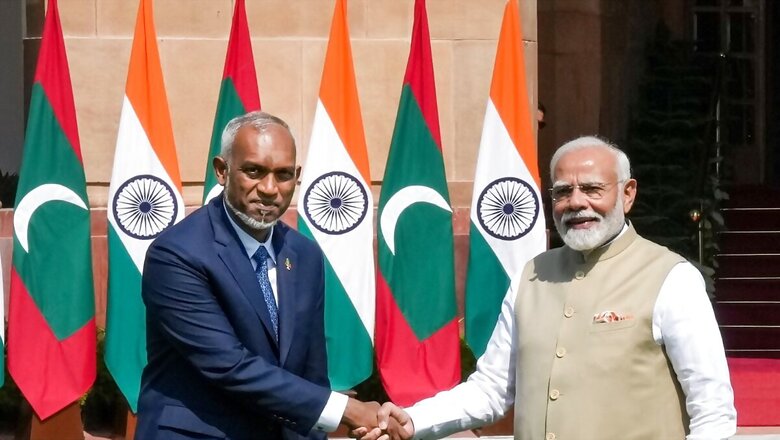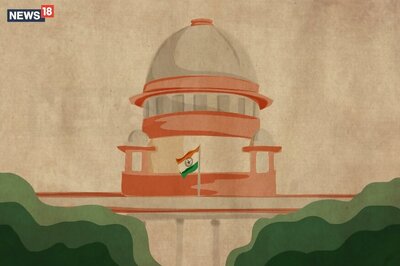
views
The visit of Maldivian President Mohamed Muizzu to India marks a significant turn in the island nation’s foreign policy. Elected on an “India Out” campaign, Muizzu initially prioritised strengthening ties with China, breaking with the tradition of Maldivian presidents making their first foreign visit to New Delhi. However, the Maldives has seemingly recognised the limitations of its China-centric approach and is now seeking to restore balance in its relationships, particularly with India.
This change in direction is likely motivated by a looming economic crisis and the realisation that reliance on China is not a viable long-term strategy. For India, this development underscores the strategic imperative of the Maldives and necessitates a proactive approach to strengthen this vital partnership.
The Maldives, an archipelago of 1,192 islands, spanning just 300 square kilometres, holds an outsized geopolitical significance due to its location in the Indian Ocean. This strategically important waterway, connecting major trade routes between Asia, Africa, and the Middle East, has become a focal point for great power competition, with China actively seeking to expand its influence. The Maldives’ proximity to these vital shipping lanes, coupled with its vast Exclusive Economic Zone (EEZ), makes it a critical factor in maintaining regional stability and freedom of navigation.
For India, ensuring the security of the Indian Ocean is paramount, as it is the primary conduit for its energy imports, trade, and naval operations. Any attempt by an adversary to establish a foothold in the Maldives could pose a direct threat to India’s maritime interests and national security.
These components also make it a critical component of India’s maritime security architecture. As stated by Amitendu Palit, a research lead at the National University of Singapore’s Institute of South Asian Studies (ISAS), “Maldives can give certain major powers the opportunity to have an influence over the shipping lanes and maritime traffic.”
India’s security concerns are not unfounded. The Maldives’ location could potentially provide China with a strategic advantage in the Indian Ocean, allowing it to monitor and possibly disrupt maritime traffic. The presence of Chinese military personnel in the Maldives, under the guise of civilian technicians, could pose a direct threat to India’s security interests.
The growing presence of China in the Maldives, marked by significant infrastructure projects and financial investments, has raised concerns in India about potential implications for regional security. China’s Belt and Road Initiative, or debt trap diplomacy, has found fertile ground in the Maldives. Infrastructure projects, such as the construction of a $200 million bridge connecting the capital Malé with the airport island of Hulhulé, have come at great economic costs for Malé.
As highlighted by the example of Sri Lanka, which is struggling under the weight of Chinese debt, excessive reliance on Beijing’s largesse can lead to a debt trap, potentially compromising a nation’s sovereignty. The Maldives’ current economic woes, with its debt estimated at 110 per cent of its GDP, according to Fitch Ratings, underscore the risks associated with overdependence on Chinese financing, and there are growing concerns about a potential default on its debt obligations.
Despite recent strains in relations, India and the Maldives share a long history of close diplomatic and economic ties. India has consistently provided support to the Maldives during times of crisis, including the 2014 water crisis and the Covid-19 pandemic. New Delhi has also been a key partner in the development of the Maldives, offering financial assistance and capacity-building initiatives. However, the “India Out” campaign, driven by anti-Indian sentiment among certain sections of the Maldivian population, has tested the resilience of this relationship.
For India, the Maldives remains a strategic imperative in the Indian Ocean, and New Delhi cannot afford to lose influence in the island nation. Therefore, India must continue to engage with the Maldives by offering assistance and support in areas such as economic development, infrastructure building, and maritime security. The development of the Thilamale Bridge project—a 6.74-km-long bridge connecting the capital city Malé with adjoining islands—and the recent $50 million lifeline extended by India to help the Maldives avoid defaulting on its Islamic bond, demonstrate New Delhi’s commitment to supporting its neighbour in times of need.
India must also work to counter Chinese influence in the Maldives without resorting to coercive tactics. New Delhi should focus on building stronger partnerships with like-minded countries in the region, such as Sri Lanka and the United States, to promote a free and open Indo-Pacific. In the realm of security cooperation, the annual ‘Dosti’ exercises conducted between the Indian and Maldivian Coast Guards, along with the Maldives’ recent participation in the ‘Milan’ Naval Exercises, highlight the potential for enhanced maritime security collaboration.
The Maldives matters to India. Its strategic location, its vulnerability to Chinese influence, and its potential to become a haven for extremism make it a critical piece in the Indian Ocean geopolitical puzzle. India must continue to engage with the Maldives, offering support and assistance, while also working to counter Chinese influence and promote regional stability. The future of the Indian Ocean region, and indeed India’s own security, depends on it.
Views expressed in the above piece are personal and solely those of the author. They do not necessarily reflect News18’s views.

















Comments
0 comment